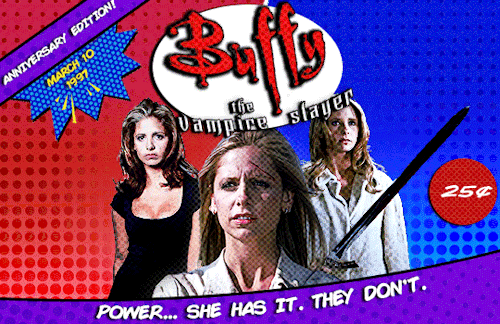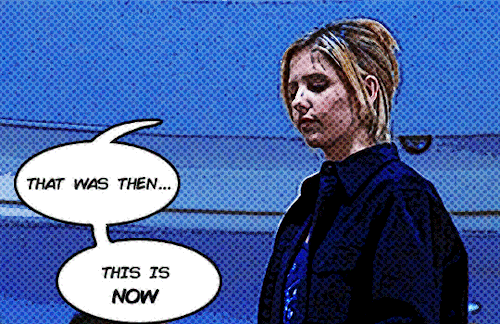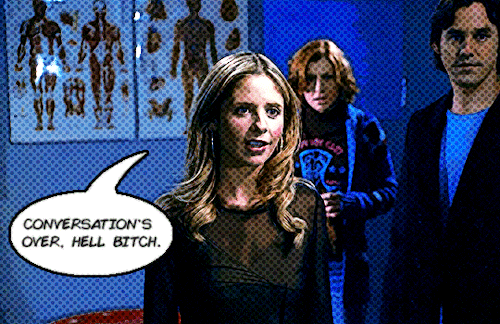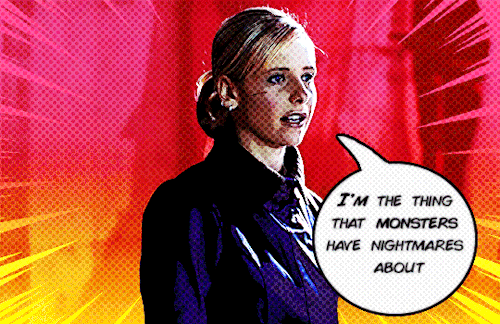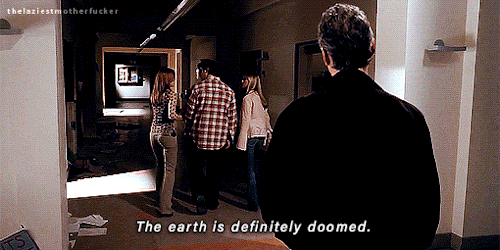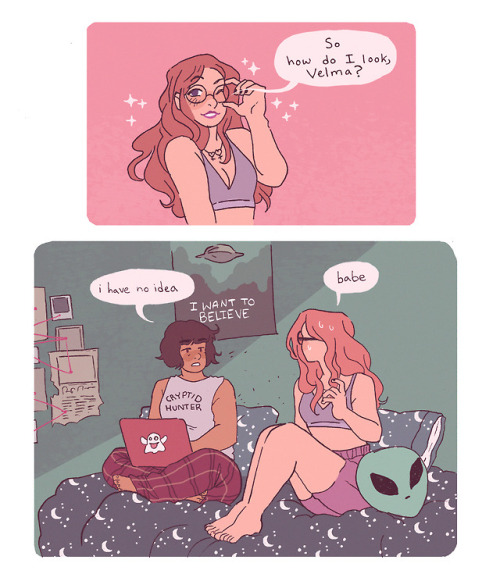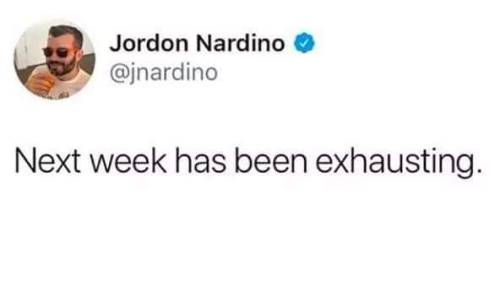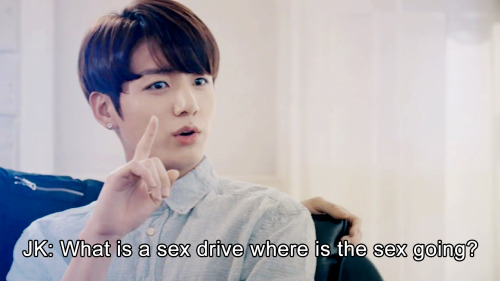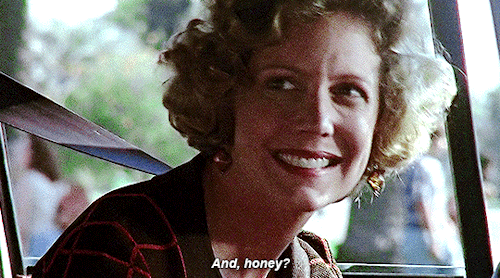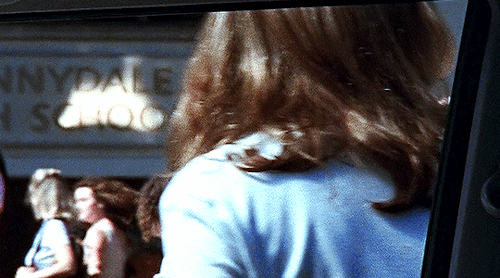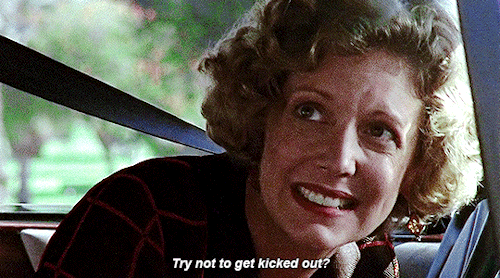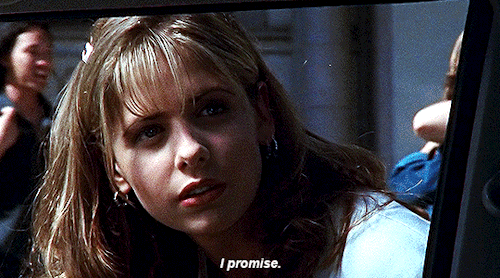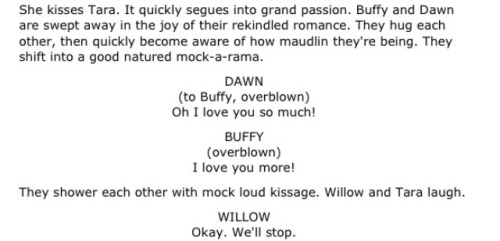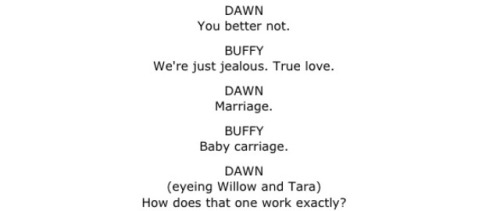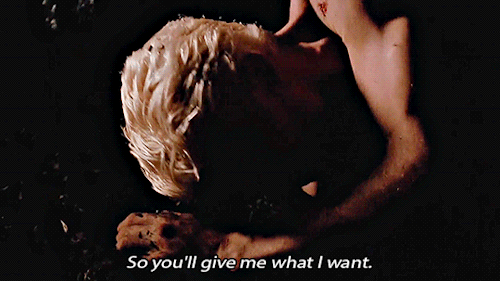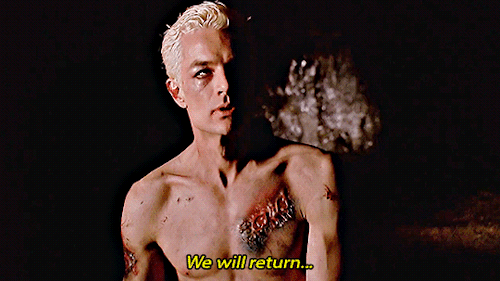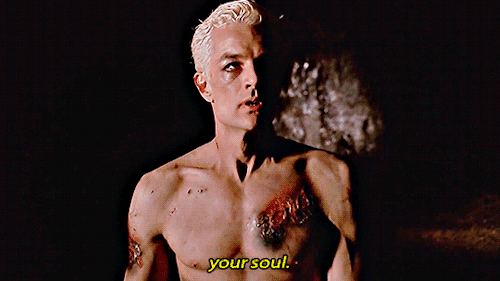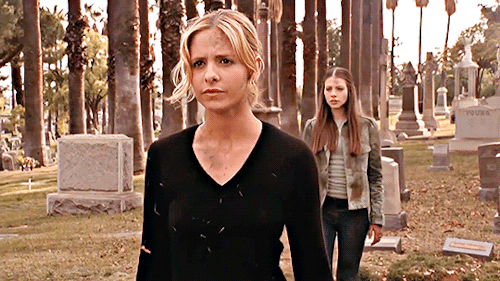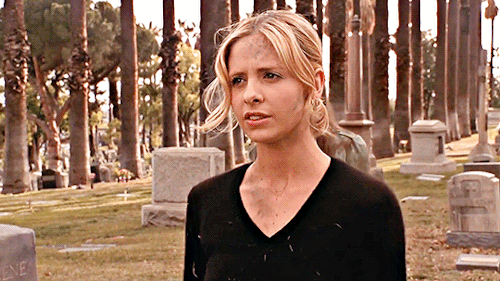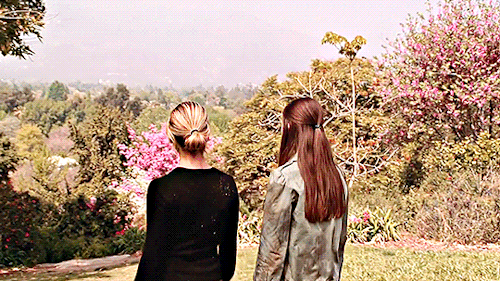#buffy the vampire slayer
Me explaining a tv show to someone like it’s real life

Because it is ✨ real life✨
I wanna know
What tv shows are you watching now?
What are your favorite tv shows of all time?
What tv shows did you never finish watching but want to go back and finish?
What tv shows are you interested in watching but haven’t started?
What tv genres are your favorite?
Who’s your favorite tv screen duo or duos?
Do you prefer Netflix or Hulu or neither?
I think I know why Joan’s the boss— I’m like a superhero or something!
BUFFYTHEVAMPIRESLAYER(1997-2003)
↝25 YEAR ANNIVERSARY: FIRST AIRED MARCH 10 1997
Post link
BTVS 3.05 I don’t even get why you care about Homecoming when you’re doing stuff like this.
#buffy sounds like being homecoming queen is something every girl is entitled to but maybe this just exposes her privilege#as a skinny pretty cis white girl#she thinks the whole world owes her
It’s not that unreasonable for someone in Buffy’s position to want some sort of tangible proof that she is valued for more than her ability to kill and die. To be Chosen to do something she can talk about publicly, and that she asked for as opposed to had thrust upon her against her will.
I actually really like this moment in parallel with the Class Protector scene in The Prom, where she finally does get her recognition. It’s a play on the ‘classic high school’ recognition she’s longing for here but incorporates her identity/role as the Slayer, which by that point in season 3 she’s come more to terms with/
And while it is her Slaying that she’s being recognized for in The Prom, it’s the ‘saving people’ rather than the ‘killing’ or ‘dying’ that’s highlighted, which is a big thing for Buffy.
Also, I can’t remember, and I’m not looking it up right now, but isn’t it canon that Buffy has been told numerous times that being the Slayer means that she’ll die young?
I seem to remember a quote about expiration dates and cheetohs.
And for someone who was Chosen to die young saving a world that won’t ever know about her, without any input on her part, to want or think she’s owed a small moment of joy in a life that will (as far as she knows) probably end before she hits her mid twenties doesn’t seem that entitled or selfish to me.
It just seems sad.
I can’t believe I’m here in 2020 for the BtVS discourse but
I’d also add that before she was the slayer, Buffy was exactly the sort of girl everyone assumed would be homecoming queen: popular, pretty, vapid. Buffy was Cordelia, but bigger and better, because she lived in the big city. Not only that, but she was a legacy homecoming queen: Joyce and Hank met at the homecoming dance. Buffy ended all of that when she became the slayer and burned down her high school gym. She lost her popularity, her friends, her home — the entire life she thought she’d have.
And she’s allowed to grieve that. Even if it’s inconsequential and silly compared to being the chosen one, she’s allowed to resent that the life she wanted was taken away from her. Being the homecoming queen is a small thing, but controlling your life and making choices that fulfill you is a really big thing. Buffy doesn’t get that as the slayer. That’s what this scene (and quite honestly the first 5 seasons) is about.
No but like I’m still thinking about this so I’m back. The thing that made early Buffy great and the reason joss whedon was unironically hailed as a feminist in the 90s because this really encapsulates what Buffy at its best was: a show about silly things like vampires and high school and teenage girls and nerds, but also (when you got past the weird themes punishing women for having sex) a show about how women aren’t allowed to be fully developed people. I mean that in the sense that they don’t control their life or their choices but often have a destiny predetermined or dictated to them by earlier generations of men.
And I know that sounds basic and absurd on tumblr in 2020, but you just really have to believe us old fogies when we tell you the gender and sexuality politics of the 90s were just unthinkably bad. I could go into 50 year cycles and 20 year cycles and post war nostalgia but just… this really was radical to see on tv in 1999/2000. At a time when the 80s powersuited business woman was still sitcom gold and the biggest political question was would Hillary Clinton stand by her man, you had a young blond girl with a literal unbreakable destiny and a limited future on TV every Tuesday and she was *salty* about it. God knows it wasn’t perfect but it was relevant.
Post link
Even more interesting is that Jenny was sent to Sunnydale as soon as Angel revealed himself to Buffy and they started getting too close. At this point, her Kalderash backstory wasn’t even written, but the show got the greatest gift of the ultimate timing coincidence. There’s also the coincidence that Calendar has a vague similarity to Kalderash. Jenny arrived just then after being told that Angel’s pain was lessening and to separate him from the Slayer. Her infiltration one episode later from an in-canon perspective is not a coincidence.
At the time of Mutant Enemy finally deciding on Angelus as season 2’s Big Bad after Whedon’s underestimation of David Boreanaz’s ability to carry the role and the Anointed One as season 2’s originally-intended Big Bad not working out at all, the original intent was actually for Angelus to kill the new character of Oz. However, the popularity of Seth Green and the potential for the Willoz ‘ship eventually settled on Jenny being on the chopping block. It also was a greater emotional hit, as Angel had more of a connection to Jenny (saving her life), whereas he didn’t really know Oz at all. The audience also hadn’t known Oz for that long. There’s also the fact that Angel had saved Giles’ life (not to mention Xander and Willow’s) and a much more profound connection to him, even if Angel was also becoming fairly close to Willow before all that was snatched away.
It also gave Giles the most emotional storyline he ever had, on top of the extra cruelty was the fact that Giles actually liked Angel a lot prior to the Angelus arc, which Giles never forgave Angel for. It was Giles who originally told Xander that Jesse was no longer his friend, but rather the thing that killed him, but it becomes Giles who can’t make that separation between Angel and Angelus. And of course, Xander hated Angel long before Angelus ever showed up, as can be seen by his numerous jealous comments well before the reveal in 1x07.
They kept doing research together and Angel was one of the few other “adults” Giles could interact with. Giles was even fascinated by the maudlin romance of a vampire in love with a Slayer. He’s not against the relationship at all.
One of the non-canon tie-in novels even had Angel spending the entire summer saving Sunnydale with Giles and Jenny as Buffy’s replacement while she was at Hank’s house in L.A. That book tells us the probable context of how Angelus got that off-screen invite into Giles’ house.
After Angelus, Giles gave Angel some begrudging credit for having the mature foresight needed to leave Buffy, which was his criticism of Spike in Lies My Parents Told Me, but that is quickly dashed when it is Giles on the phone who Angel is begging for help to save Fred’s life, only to be utterly rejected and insulted with visits by Andrew. As much as I’m loathe to consider the comics canon, one of the few good calls was to have everything that came out of Andrew’s mouth be more lies that never came from Buffy, but unfortunately that doesn’t excuse Giles being on the phone call refusing to help Fred only because it’s Angel who made the call.
Again, as much as I’m loathe to acknowledge the comics, one of the only bright spots, despite the utter character-assassinating clusterfuck of how it got there (including Twilight!Angel killing Giles), was Angel saving Giles from having sold his soul to Eyghon, which also calls back to Angel (or, more accurately, Angelus) saving Jenny from Eyghon.
In later seasons, it’s interesting to go back to these early pre-Angelus interactions with Giles and Angel where they actually had a lot in common (two nerdy, well-educated bookworms, not unlike the relationship that developed between Angel and Wesley) and often had similar perspectives on what would be best for Buffy and Angel’s own impossible situation. Angel broadcast all his misgivings about the relationship in 1x07 and repeated all the reasons standing between them numerous times, so it really wasn’t just hearing it from Joyce (much is made of her having a better relationship with Spike and never getting past Angel taking her daughter’s virginity, despite the fact that they actually have more interests in common, most especially art and collecting, and were in complete agreement that the relationship was never a good idea) and the Mayor (a fellow immortal who lived out the same tragedy) that led to The Prom. It is Giles whom Angel tells concerning why he’s been so absent in Out of Mind, Out of Sight.
Angelus didn’t just destroy any future for Angel having a relationship with Buffy, but also destroyed most of the budding relationships he had in Sunnydale. Angel, Wesley and Cordy were thus the only characters at the end of season 3 who had nothing left to lose by leaving.
When Buffy couldn’t go to Giles for advice or use Willow as a kind sounding board (without Xander’s judgment), it was always Angel whom she ran to. Angel was whom Buffy ran to whenever what worried her was about her parents’ divorce, wanting to be a normal girl, not getting to live long enough to have a future (or the children Angel can’t have) or why they fight. Gingerbread has the philosophical precursor to the Epiphany speech. Buffy has an interesting history of replacement father figures (Giles being the most prominent) and Angel’s paternal tendencies are a huge part of his arc. He’s a Prodigal Son with another Prodigal Son, after all, not to mention his own often-paternal protector/provider relationship with his team at Angel Investigations. So, when Angel was taken from Buffy (blaming herself for killing the person she loved most, thus the connection of her to James Stanley), she also lost one of her biggest confidants. The whole season is having her relationships and reasons to stay in Sunnydale stripped from her.
Wesley, of course, was written entirely as Giles’ mirror when first introduced. He’s there to make Giles look cool and hip by comparison. He was even more of a bookworm than Giles ever was and had much faster recall, more readily having information without all-night research. The only character who challenges Angel for the character with the biggest eidetic memory database concerning history, languages and demonology is Wesley. It’s often Angel who has all the answers in the first season and a half that Giles often doesn’t (the Hellmouth, the Harvest, the Master, the Pergamum Codex, what the Anointed and his followers are up to, Spike, Drusilla, the Judge, etc…). Witch not only lies about Giles’ spell casting history, but it turns out Giles’ entire tweedy persona is a big lie and that he’s actually more street smart than book smart. Wesley is the exact opposite initially, though ends up so brutal that he gives Angel a run for his head-over-heart, big-picture-thinking tendencies. Wesley and Angel end up mirroring each other as well, and you can see the start of it as early as Wesley’s willingness to sacrifice Willow to stop the Mayor.
In regards to the acting coach’s perspective on Buffy season 1 (last reviewing Witch): https://www.youtube.com/watch?v=7tt5L6IeHT4
Witch was actually the very first episode shot.
Many new shows will film a few filler episodes first while the actors are still building their chemistry, so that the first episodes aired will be even better. This was absolutely the reason why Witch was filmed prior to Welcome to the Hellmouth and The Harvest. Might be worth noting in terms of green performances and chemistry. The chemistry is great already, though this is luckily a very fatherly episode for Giles, so it’s not as jostling as that slightly creepy, personal space-intrusive version in Welcome to the Hellmouth shot later. In Nicholas Brendon’s case with his visible waiting for the next line, outside of the unaired pilot, *this* was actually his first episode.
Obviously, this is one of the cases where the pilot was never aired (for good reason–and not just because of replacing Willow and Flutie) and many times those will have scenes redone for airing. Sometimes things are reshot due to replacing an actor, but without reshooting the whole thing. For example, Smallville had a Martha Kent stand-in due to Annette O'Toole being already cast, but only available at a later date.
In Buffy’s case, the unaired pilot was obviously a lost cause. They were still working out how to do major SFX staples of the show like the dusting effect (they tried stop motion before settling on dodgy CGI with no skeletons until season 3), as well. Even the makeup changed a bit over the first season from Julie Benz being the original test dummy for The Lost Boys prosthetics, as can be seen by the white/purple makeup being made more flesh tone. It was her first scene that coincidentally changed the least in the rewrite and performance (except for a costume change) from the unaired pilot to Welcome to the Hellmouth. She also was originally meant to die in what became The Harvest’s showdown, but was kept for another episode (and then a lot more episodes!) by having her run away (note how often Darla runs away from danger!) from Willow’s holy water.
Darla’s costume change became the Catholic schoolgirl look (she was just wearing a floral ‘90s grunge dress before) that got an explanation in 1x07. Darla doesn’t know she’s trying to jealously scare off a Slayer (she doesn’t know until the mausoleum scene) with the dead guy in the gym locker, but she knows Angel is in Sunnydale and has been following a schoolgirl. Darla later mocks Angel for this, but also exposes her insecurity and jealousy, all the way later in Dear Boy on his spinoff. Angel, of course, is Catholic, so that’s another pointed jab. A lot of viewers don’t even pick up on the Catholic schoolgirl uniform, which was worn prior to Darla knowing Buffy’s secret identity, being that meaningful. The other thing viewers don’t pick up on in regards to 1x07 is the in-hindsight meaning of Angel having human blood in his fridge after two decades eating rats and how that potentially affected his ability to socialize with humans and why he knew about delivery day at the hospital in The Dark Age, despite Whistler mentioning blood from the butcher. Something as simple as a costume change got a whole character-building backstory in a later episode. That layer of storytelling was absent in the pilot.
For continuity reasons that weren’t because of anything being performed badly like Buffy’s hair color and the school library becoming a set (Torrance High’s spiral library staircase would’ve clearly become a hazard for Tony Head!), the footage had to all be redone. Buffy had a slightly longer dialog in the library scene, for example, that is actually something of a loss because it goes into more depth about what happened to her in L.A.
Xander’s tour of the school isn’t strictly necessary for the plot, but was a chemistry-building scene, and perhaps a remnant of Joss Whedon’s intent for him to be the every man who wins the fantasy girl who is out of his league, rather than the female protagonist instead winning her unattainable, forbidden fruit fantasy (the male gaze vs. the female gaze).
Whedon was still being talked into having the Angel character at all back then, originally intending for Xander (notoriously known for being Whedon’s not-so-nice “nice guy” self-insert) to be the love interest. David Greenwalt, Marcia Shulman and Gail Berman were Angel’s biggest cheerleaders and the latter two (rather degradingly described as “puddles of drool”) outvoted Whedon during casting. The WB also only agreed to renew the show (they were actually quite disappointed by season 1) if season 2 contained more Angel and the Bangel romance, which was heavily promoted (look at any of the WB’s ad campaigns) and brought in the show’s highest ratings (the entire show’s ratings peaked at Surprise/Innocence).
Not only was Whedon against casting David Boreanaz, comparing him even to the jocks who beat him up in school and talking about how he hated making a spinoff about a white Alpha male lead as a hero, but he was reluctant to have any good vampires at all. Come season 2, Whedon was also pushing James Marsters up against a wall and threatening to fire him because he was getting too popular. Whedon made the remark that Marsters had it easier than him getting laid because of how he looked (that was on Marsters’ second day of work well before School Hard ever aired!). Whedon didn’t like it when he ended up with a good vampire sex symbol the first time, then ended up with two sympathetic vampire sex symbols on his show.
Coincidentally, both characters weren’t meant to stick around and survived intended final death scenes, as well. Angel was never meant to be more than a cryptic messenger for a few episodes (before he became the love interest or a vampire), then wouldn’t have come back from hell if it weren’t for the spinoff (which the WB wanted–it wasn’t just Whedon being finally impressed by Boreanaz’s performance as Grace Newman). Spike was originally intended to be killed by the church organ falling on him. Faith was originally going to hang herself after staking Finch.
For that matter, the original villain of season 2 was meant to be the Anointed One (hence the absurd build-up in season 1 that goes nowhere) until it was apparent that Collin’s actor had grown up too much and wasn’t that successful (cue Spike flash-frying him in a cage), with Whedon reluctant to believe Boreanaz could carry the Big Bad role. Angelus arguably turned out to be the Buffyverse’s greatest villain and Buffy’s most personal. The most subtle foreshadowing was undoubtedly the fact that the production didn’t feel the need to hire Mark Metcalf for a silent performance of the Master in When She Was Bad, so it’s actually Boreanaz (look for his wider mouth shape) beneath the Master’s prosthetics. Buffy’s having nightmares of the Master, but it’s really Angel underneath! When She Was Bad also teases what would happen if it came down to a fight between Buffy and Angel.
Whedon’s intentions being outvoted so forcefully by other writers, producers, the network and audience is mirrored by the likes of Sera Gamble attempting to villainize and kill off Castiel (whose Little Mermaid-esque arc arguably overshadowed the Winchesters and created an unintended third lead, no matter how much he was nerfed of his powers and left out of Monster of the Week episodes due to him making human hunters irrelevant) on Supernatural, only to fail with a massive audience outcry and was forced out of the show herself. Shows occasionally get away from their creators or showrunners.
Greenwalt had to also create the soul/curse mythology (massively to the franchise’s benefit!) to explain how Angel was the first gray-area exception to Whedon’s black & white world-building where vampires and demons are always bad and only there to be allegories for human problems. This is in stark contrast to today’s vampire mythologies that are no longer default-evil and mostly about “choosing boyfriends, the movie”, whereas the Buffyverse ended up taking most of its vampire archetypes from Anne Rice, despite Whedon absolutely hating “that crap”. Ironically, Rice’s vampires are all sexually impotent and murderously evil, despite Louis feeling guilty and eating rats in alleys (sound familiar?). Come the spinoff, it wasn’t just Angel, but characters like Doyle and Lorne (not to mention Wolfram & Hart’s human lawyers) further muddying that original intent. The Buffyverse was straddling two eras of genre fiction in regards to the development of the evil-to-sympathetic/misunderstood-to-good monster.
The pilot definitely felt like it was a better set-up for Xander to not be so easily friend-zoned, but the friend-zoning is complete here in Witch. That one scene here in Witch actually turns out to be a significant one, and it’s especially significant in an episode that was shot first and doesn’t contain Xander’s rival. By the time that Witch was filmed, it appears the writing staff were aware that Xander wasn’t going to be the love interest. The next few episodes also are aware of it, even when Angel doesn’t or barely appears. Earlier drafts for Never Kill a Boy on the First Date and The Pack didn’t have Angel juxtaposed against Owen/Xander (this episode got the heaviest rewrites of all) or the scene of Buffy (wearing Angel’s jacket) and Willow discussing Angel in the Bronze + Xander’s jealousy under the hyena spell at all.
Only 25 minutes were presented of a full-length pilot script (dated January 1996) that even contained Angel (back when they hadn’t even decided he was a vampire yet and you’ll notice the bigger Angel episodes were all the last episodes written and shot with scenes dropped into earlier scripts that didn’t contain him before) as a mysterious motorcycle guy who stakes a vampire outside of the auditorium showdown. Boreanaz even mentioned shooting the motorcycle scene in the 20th anniversary special that probably confused anyone who hadn’t read the unaired pilot script (which is only a minute fraction of the franchise’s older diehards who even know where to get a hold of it!)!
Despite Boreanaz being already cast with a cut scene, it is only Mercedes McNab who is in both the unaired pilot (yet not Welcome to the Hellmouth) and Not Fade Away. Boreanaz is the only actor in both Welcome to the Hellmouth and Not Fade Away. He’s also in the most episodes by a far margin. Angel is in 167 episodes, with Willow coming in at 147 and Buffy only 146.
Smallville really just took its formula from Buffy the Vampire Slayer (as did the revival of Doctor Who, same as Angel: the Series doing the same for Torchwood by Russell T Davies’ own admission), which also has a superhero in high school origin story and a strange town overrun with freaky things happening. Smallville’s meteor freaks were exactly like the Hellmouth and the high death rates of their respective student bodies.
Roswell is another show that had a similar setup and was actually the first WB show about aliens with magic powers in high school. Max Evans is not too subtly Clark Kent-like, right down to the famous moment of transforming a lump of coal into a diamond. The alien/human hybrid quartet of Max Evans, Michael Guerin, Isabel Evans and the infamous Tess Harding are reincarnations of alien royalty/elite from a destroyed planet, so the connection is obvious.
Except that show went far further with what would happen if the government found out than Smallville dared beyond a few episodes here and there. Max certainly had more done to him (the White Room and going on the run in the finale) than Clark ever did in that regard. Humans who get a little too close to the inhuman with plans for science or personal gain certainly is a trope that pops up in other genre shows (often humans desiring eternal life at a cost or captive experimentation/torture).
Sheriff Jim Valenti (who was the villain of the Roswell High books the shows were based on!) turned out to be the kids’ fiercest protector, not unlike Lionel Luthor, despite being initial antagonists. Lionel being the king of horrific fathers contrasted hugely with Jonathan Kent. Jor-El’s A.I. practically martyred Jonathan in a trade for Lana Lang, so this version is absolutely not comparable to the Christopher Reeve version’s relationship with Marlon Brando’s! Smallville’s Clark is nearly a reversal of the old films in regards to farm boy Clark being the real deal, not the mere disguises of Superman and the hapless reporter (this is also true of Dean Cain’s iteration), as well as the nurture over nature message of the Kents being his true parents in all but blood, whereas the focus is strictly on Jor-El over Jonathan as the father figure in the 1978 and DCEU versions.
Closest to danger Clark ever got outside of Lex Luthor’s experimentation (only with the anonymous blood vial that eventually led to hybrid Lex/Clark clone test tube baby Conner Kent) was from General Sam Lane and the anti-vigilantism plot, but Clark never got nearly so exposed. Max also told his secret in the first episode, so it’s a stark contrast to how long it took for Clark to tell his love interests and friends. Clark and Lucifer Morningstar are the kings of the long-delayed reveal! By contrast, Angel waited seven whole episodes and most of the rest of the characters mentioned here did so in their first episode, if not their first scene.
The WB was already a home to many shows like Smallville, though it certainly started DC adopting the channel as their home to drop their properties into that already-established format.
Angel: the Series, Smallville and Supernatural were the more masculine side (Angel: the Series and Supernatural are definitely the most mature, horror-based shows, as well) on a channel that also had Buffy the Vampire Slayer (the original genre show on a channel that was heavily just sitcoms and 7th Heaven prior to 1997 and quickly transformed the whole channel), Charmed and Roswell (not to mention Dawson’s Creek and other more soapy, non-genre offerings).
Shows like The X-Files and Buffy the Vampire Slayer were the ones that pretty much formed everything we expect from a modern fantasy/sci-fi/supernatural/horror series now, including the mix of overarching long-form story arcs and soap opera/relationship dramas mixed with the Monster of the Week and seasonal Big Bad formats. Monster of the Week (Smallville used Freak of the Week) and ‘shipping were terms coined by The X-Files’ fandom (yep, the biggest controversy of that show was whether Fox Mulder and Dana Scully should remain platonic colleagues as intended by the creator or become a romantic relationship, which took an interminable slow burn of seven seasons), while Big Bad (and thus arcs surrounding that Big Bad seeded throughout the season) was coined on Buffy the Vampire Slayer. All these terms are used for discussing nearly every subsequent genre show today. Television prior to these shows did not have these formats, minus the old-as-dirt episodic Monsters of the Week, but not using that terminology yet.
Smallville was a marriage of comic book superheroes into the genre show format that was already going strong on the old WB. Some of these other non-comic-origin characters wouldn’t be out of place in the comic world either. Definitely true for Buffy Summers and Angel, as they basically are superheroes. Buffy has the more straight-forward Peter Parker-esque origin story, while Angel’s is told completely non-linear (often through a slow drip of flashbacks–his soul was returned a century prior, not during the course of the show, yet he most certainly didn’t become a hero then).
It’s surprising that Supernatural never quite went all-out with a real comic tie-in presence beyond some short runs early on. Neither the comics or the novels use Castiel much at all, who is the most super-powered main on the roster (so much so that the show writers were terrified to put him in Monster of the Week episodes and even tried to kill him off in seasons 6/7 due to him making the Winchesters irrelevant). Castiel is the Eldritch being-level angelic equivalent of The Little Mermaid trying to understand humanity, but with the tragic ending of the novel.
Clark himself has a mix of Dorothy Gale (check out that Over the Rainbow shot on the bridge in Smallville’s pilot, which is an image also echoed in Luke Skywalker’s binary sunset, followed by him doing an Ariel pulling Lex Luthor from the water) and Peter Pan (more than just the flying boy–he also has an immortality problem) in his DNA.
It’s that little piece of inconvenient canon (alluded to numerous times through Smallville) that is at the heart of the adverse reactions of many Superman purists who were horrified by Smallville’s Clark choosing to live a human life and have a family with Lois in the CW’s Crisis on Infinite Earths. It wasn’t just because Tom Welling still refuses to wear tights, but because it was the real unsolved existential crisis facing the character. Conversations with the Kents, Dax-Ur and General Lane all exposed this issue as an insecurity he had quite early on in the series. It’s hardly teen angst, nor was it with Angel and the Doctor saying it repeatedly to Buffy and Rose; it doesn’t make it teen angst just because they were teenagers. Clark likewise shares the tragedy of many other inhuman immortals (and yet, they keep doing it!) in that he can’t father children naturally with humans without some kind of sci-fi workaround (like Blue or Gold Kryptonite).
We might like to see these characters be Peter Pan forever, but sometimes even Peter needs to grow up (as in Hook), lest he forever remain a tragedy. Make no mistake, the immortality trope is always a tragedy, which is why so many of these characters either run away from seeing it played out or they most desire to live human lives. Having duties greater than themselves and a need to save lives they’d never be able to as mortals are often the reasons for these sacrifices, but it still remains a sacrifice and ultimately a damnation, not a gift. These characters are either doomed to lose everyone they’ve ever loved or go out in a blaze of glory, which is what television shows using the trope are actually daring to show more recently.
Not being a tragic horror story, Superman tends to avoid it, but it’s the same problem. That brief scene in Crisis on Infinite Earths was more in line with Smallville than Superman purists wished.
The Doctor is Peter Pan. It’s most obvious with the imagery of little and big Amelia Pond in her nightgown, but the story with Rose Tyler juxtaposed beside Sarah Jane Smith also shows his Peter Pan-esque tendencies. He’s the immortal who keeps picking up new companions to take on far-off adventures, only to leave them behind over and over again before he has to face their human mortality. Although the Doctor is older than Spock, he has picked up many Spockisms over the years like touch telepathy (yup, the Vulcan mind-meld), the half-human aspect of the 1996 TV movie that fans and the show do their best to ignore and the 10th Doctor’s sacrifice via a glass case of radiation (see The Wrath of Khan).
Angel, of course, is Pinocchio (with a big dollop of Highlander’s Prize), the Beast, the immortality of Peter Pan, Louis de Pointe du Lac and pre-retcon evil!Lestat de Lioncourt (the retconned one is, of course, Spike) morphed into Dr. Jekyll and Mr. Hyde, and a touch of Steve Rogers meets Clark Kent, but with the aesthetic (not character) of Bruce Wayne (that mix is all there). Like Pinocchio and the Beast, there are those major elements of temptation, redemption and atonement.
The Buffyverse definitely borrowed heavily from the sympathetic vampire begun by Varney the Vampire, Nosferatu’s plagiarization of Dracula that gave birth to death by sunlight (see the whole aesthetic of the Buffyverse’s Master), the antiheroization (quite evil initially) in Dark Shadows, the archetypes of Anne Rice (the entire Master + Fanged Four are her lineup–Akasha, Gabrielle, IwtV!Lestat/Louis, Claudia and retcon!Lestat vs. the Master, Darla, Angel(us), Drusilla and Spike), the prosthetics of The Lost Boys and the vampire detective setup of Forever Knight (which copied Barnabas Collins’ cure for vampirism arc, while Angel’s Shanshu borrows more from Highlander’s Prize). Blade and Angel added apocalypse-fighting/comic superheroes to that mix.
Ironically, the more recent examples of the good vampire have gutted their mythologies of evil-default vampires entirely (making the exceptions to the rule far less alienated and unique amongst their own kinds) and certainly kicked out the apocalyptic superheroing for soap opera. The Buffyverse is ironically closer to Anne Rice’s full-blooded, evil, murderous inhuman creatures (no matter the guilt and eating rats in alleys) than it is Twilight and The Vampire Diaries in spite of the human/inhuman romance plots, marking a strong separation between the WB’s era and the CW’s.
That’s a strong example of how the genre show environment has changed in the last two decades, so it’s not just the differences between the eras of Smallville and the Arrowverse/DCEU.
Supernatural is a particularly weird example in that it ran for so long with the same cast (unlike Doctor Who, which is fast approaching its 60th anniversary and has gone through many changes, not just its format) that it was still following the same show format and catering to a generation who grew up along with it (not to mention the actors going from young to middle-aged) from 2005 through 2020. The format all the way to the end (though never again as desaturated, jump-scare horrific as that first season was–its inspirations from The X-Files showed) is most certainly pre-streaming and owes much to its old WB origins using a formula born in the 1990s, despite the CW’s rebranding in 2006. Castiel’s ushering in of the whole angel mythology was the most seismic change in Supernatural’s history, though even he was like a horror creature early on. The show certainly had early comedy episodes, but they definitely got more frequent later. One only has to look at the season 15 premiere’s handling of the Woman in White and Bloody Mary’s returns to see how alien the season 1 atmosphere was to the show by then.
Buffy the Vampire Slayer likewise shed its gothic horror atmosphere and went into the sunlight (not for the better) around the time Angel took his gothic fairy tale-turned-noir with him to L.A. See Lucifer aiming for the same aesthetic in its first season. Smallville was likewise a show that spanned the WB and CW, but before the television landscape completely left that late-'90s/'00s aesthetic. You can definitely start to feel similar differences in the change from Smallville High to Metropolis and Lana to Lois. There’s a pretty stark generational shift in the shows aimed at late Gen-X/older Gen-Y (Millennials) and now Gen-Z (Zoomers). That’s the biggest shift between the WB and the Arrowverse-era CW.
Castiel, despite him learning how to love, is the ultimate example of free will in a mythology that has none by design (he truly did have a “crack in his chassis”) and even adopts a son whom he can finally relate to, ends with him tired, very sad and unloved in return. Not a single character in the history of Supernatural ever tells Castiel that they love him. Frankly, Meg and Crowley, who kept saving his life, showed more care about and affection for him than the Winchesters, particularly Dean (who belittled, refused to help and abandoned Castiel for years before the Jack and Mary drama shattered the relationship irrevocably). Sam, who used to feel the same othering from John and Dean as the Boy with the Demon Blood that got heaped on Castiel if he dared remind Dean he wasn’t “human, or at least like one”, had a bad habit of following his brother in questionable acts like putting Jack in the box. Castiel says he loves others several times, but he never once hears it back. As in The Little Mermaid, Castiel sacrifices himself for someone who will never love him back, except in place of sea form is the black goo of the Empty. At least Jack cared, but you’ll notice Castiel is nowhere to be seen when the Winchesters reunite in Heaven. Not even Sam (who was equally sad and tired at the end, while Dean was just angrily lashing out at everyone while blaming everyone but himself) bothered to place a single photo of Castiel amongst his shrine to John, Mary and Dean. Sam literally knew Castiel longer than he ever knew Mary and his relationship with John was so bad that he left his father and brother to go to Stanford. Boy, did that final episode say it all about Castiel loving, but never being loved in return. Bobby Singer was wrong; it turns out that, for the Winchesters, family did end in blood.
The alienated outsider archetype who doesn’t quite fit in amongst human society (often with an immortality/lifespan problem on top of other interspecies differences), but often desperately wants to find human belonging, love and family, is true of characters like Clark, the Doctor, Spock, Connor/Duncan MacLeod, Angel, Castiel, Lucifer, etc… These are subsequently the shows and storylines that borrow most from the Superman mythos.
See the many takes on Superman II’s Pinocchio plot, except having to give it all up for a higher purpose (not to mention many other Beauty and the Beast, The Little Mermaid, Pinocchio and Peter Pan parallels), such as Angel’s I Will Remember You, Smallville!Clark’s Arrival/Mortal/Hidden, the Doctor’s Human Nature/The Family of Blood and Castiel’s season 9 arc.
That’s Superman and Clark’s real impact on the television landscape.
Angel, Tenth Doctor, Castiel & Lucifer - Paint It Black
I still say the best spinoff they could possibly ever make would be all the Chosen Slayers getting deactivated, then Buffy and a Shanshu’d Angel (IMO, this plot really would only work with Angel, because it actually matches his story arc, not Spike’s, to want a human life and fatherhood) have a daughter who grows up not knowing the truth about her parents (and half-brother!) until it’s forced to come out.
I would particularly note that the first thing that happens to newly-called Slayers is their prophetic dreams. If ever there was a way to start breaking secrets to this new heroine that also serves as flashback exposition featuring the old shows, this seems custom-built for it. It’s exposition for the audience that never saw the old shows as well as an introduction to a key Slayer ability, but most importantly, it’s personal family revelations that go far deeper than historical flashbacks of unrelated persons or monsters that mean nothing personal.
These would be scandalous secrets for a baby Slayer, given Buffy was the rule-breaking Slayer who is most famous for having romantic relationships with the very creatures she’s supposed to slay. Angelus would be the worst family secret of all! This story has all the makings of an existential crisis before acceptance. That would also be a good place to drop in Connor’s history. Buffy never actually got to react to that bombshell either, so that would be an interesting drama with her, as well.
Buffy and Angel both tended to feature heavily in prophetic dreams, so it also just feels right to continue that.
If there’s some reason why David Boreanaz (who, let’s face it, is really not getting younger and SEAL Team can’t go on forever) can’t or is unwilling to appear, one could have an explanation that Wolfram & Hart has had him trapped in a holding dimension for years as punishment.
You could even build an arc around that with Buffy or the daughter trying to find him. Basically, a kind way of explaining Angel’s absence if necessary and Buffy unfortunately having to mirror her single mother (which was a fear of hers), despite it being no fault of Angel’s. It would be yet more cruelty for him to miss out on yet another child growing up, which would be a dramatic plot point itself. It could actually become a story where he does matter quite a lot, despite initial absence or mystery.
An even bigger shock than mom having Slayer superpowers and a world full of supernatural forces would be a reveal that dad is a 394+-year-old (depends on if you count hell–in a modern-day spinoff, Angel is rapidly approaching 400 years!) ex-vampire.
The most interesting and fitting story you could ever do with a maturing Buffy would be having her be a mother and trying to have a normal life.
This would also give Sarah Michelle Gellar a starring role that allows her to be age-appropriate, yet also having a younger generation that the original audience can still care about because she isn’t completely divorced from the two previous shows in the way that an unrelated Slayer spinoff would be. It allows the core storylines of *both* shows to truly matter, far more than a Buffy Steele-Gunn offspring would.
—
Just a a few notes about my pitch for a continuation that works with the real ages of actors and their availability… I should also note that Xander (played by Nick, anyway–Kelly might work for a flashback) is a character who could never appear in live-action again, so maybe he could be used as another event that contributed to Buffy’s retirement besides pregnancy.
If the Shanshu and conception were directly post-NFA, any offspring would be 16 years old right now. IMO, if there were any plans to give SMG a series with her in a major supporting role, this just means that the space for how long between NFA and the Shanshu or how long Bangel got to be with each other widens for however many years it would take to revive the franchise.
I strongly believe that the best option for the franchise would be a back-to-the-suburbs story exploring age-appropriate Buffy facing motherhood, rather than trying to turn Buffy into a war general surrounded by nothing but subordinates (horribly alienating future for her) with a lack of equals or a grounded setting à la the season 8 comics. If you want to introduce the Buffyverse to a new audience whom you can’t expect to watch 24-year-old shows until they’re interested enough by the revival, you’re going to have to ground characters in a relatable reality.
As for how a new Slayer would be called after deactivation, I firmly believe the line is through Faith now anyway, so it would just take her dying for a minute à la Prophecy Girl for a new Slayer to be called. I would definitely want Faith in the show!
I feel like SMG’s concern was less wanting to reprise the role entirely, but more concern that she’d be expected to play the same exact role in her 40s. This is giving her a role that fits a woman (and a mother in real life) who is in her 40s and is a major supporting role rather than he young lead whose story is being centered on.
As for the Angel situation, SMG might actually be more willing to return if she could beg DB to come back for perhaps an initially-limited role and the scenario is one I believe she’d actually support, as it fits with her preferences!
While it might seem that Buffy as a single mother retreads the original, Angel is obviously nothing like the Hank situation (not to mention Joyce and Hank being completely clueless), so the circumstances of the father would be quite different from Buffy’s own situation, while also feeding into her own stated fears about her future.
This also brings up all the conversations in Bad Eggs, The Prom and the Chosen cookie dough analogy (children are mentioned again) to the forefront. Unlike with the other options, it was something that came up repeatedly. Admittedly, it was always by Angel due to his infertility and the human life he most desired; all of which ended up being an important part of *his* story.
However, a part of Bad Eggs that is woefully underrated is that Buffy was disappointed when Angel told her vampires can’t have children. She immediately covers it up with a babble speech and then starts making excuses for why Slayers are unlikely to have that kind of future. Young Buffy did not disregard it because she didn’t want children ever at all, but because the person whom she saw that future with was someone who couldn’t have them.
Enter Nikki Wood, where Buffy learns that at least one Slayer was definitely a mother, which she was clearly surprised by.
That’s another reason why I can see Buffy, if she got her hopes up with post-Shanshu Angel and conceived, would do anything to be a good mom by not being all about “the mission”. She would never want her child to be raised without parents. And I think she’d be doubly sensitive to that, not just because of Nikki, but because of Hank leaving and Joyce dying.
Buffy also became surrogate mother to Dawn, who was made out of her (in a sense, she is her real mother), so Angel’s situation with Connor actually had a direct mirror in Buffy’s situation with Dawn.
But those conversations were also not just about wished-for children that couldn’t be conceived, but also asking Buffy to think about what she wants for her future if she took out the belief that Slayers don’t live long enough to have one.
This show would be the answer to what happens to a Slayer when she does live long enough to have the future she barely wanted to get her hopes up for before.
Buffy (ditto Angel) is the character for which this story actually has a ton of setup in the shows themselves. These characters talked about it! And the circumstances are really nothing like Joyce and Hank, even if the initial setup plays into both Buffy and Angel’s worst nightmare scenarios about parenthood: being a single mother and not getting to raise the miracle child you thought you’d never have. That kind of bittersweet writing that shirks too-good-to-be-true wish-fulfillment is a cornerstone of what makes it a Buffyverse storyline.
If the daughter’s family lied to her about their history to keep her safe and protect her from knowing what goes bump in the night (making them the polar opposites of Hank and Joyce in regards to knowing all too well–especially Angel’s experience of being the worst thing you could bump into at night, rather than utterly clueless), that would certainly be a conflict. Especially if she found out in a particularly shocking way (say, prophetic dreams).
And if Angel (I’d like to imagine he has the company of ghost!Wesley and maybe Illyria and Spike) has been taken for punishment by Wolfram & Hart, it might really confuse her if she doesn’t know that he didn’t just leave or some other excuse Buffy covered it up with.
Wolfram & Hart would also probably love the irony of Angel getting what he most desires (to be human and a father), only to punish him with it by wasting his remaining years separated from all that he loves.
That was never just a Bones reference being made and the season finale admitted it.
https://www.youtube.com/watch?v=jv_1dJk5yEM
David Boreanaz played the ironically-named Angel on Buffy the Vampire Slayer and Angel: the Series. His character has *so many* parallels with Lucifer (far more than Booth outside of the law enforcement/crime procedural connection).
Angel’s spinoff also has noir crime drama aspects mixed with the supernatural starring an immortal protagonist with a dark past and infamously villainous reputation fighting evil as a supernatural private detective in the City of Angels (a city known for its dark underbelly juxtaposed with fame and glamor, broken dreams and chasing eternal youth) and navigating human law (including the LAPD and evil lawyers) while not legally existing.
Angel also fell in love with a blonde human heroine (Buffy Summers) after lifetimes of self-destructive, not-so-heroic behaviors (getting his soul back did *not* make Angel a hero and human Liam was a lecherous drunk with unfulfilled ambitions and father issues) who inspired him to become a better man and make human connections.
AtS made heavy use of sprawling nighttime Downtown L.A. cityscape shots, which Lucifer also shared an abundance of.
During both of their first cases, they failed to save the troubled blonde girl they were trying to help (Tina and Delilah, respectively). They also have a connection inside the LAPD through a blonde cop who also takes their identity secrets pretty badly (Kate Lockley in Angel’s case).
Note that Buffy not only screamed (twice, given it repeated during her memory loss in Halloween), but also came after Angel with a crossbow when she thought he’d attacked her mother (it was Darla), so Chloe taking the Devil face reveal (Monster Reveals are iconic old horror imagery) poorly to the point of considering poisoning is par for the course. However, it only took Buffy seven episodes instead of three seasons to get the identity reveal via seeing the horrific second face (arguably also an accident on Angel’s part).
They are metaphorically or literally Hell’s angels. They also had long stays in Hell or a hell dimension.
Lucifer and Angel are also both Prodigal Sons with long-held grudges against their long-absent fathers (patricide in Liam/Angel(us)’s case) and they’re later faced with a situation where they have unexpected, thought-impossible offspring who show up as adults (neither got to raise their miracle child) wanting revenge. Yup, major Connor/Rory parallel there.
Angel is also in a constant struggle with the Powers that Be manipulating his fate and free will (like Lucifer, he’s a champion of free will no matter the cost) and making him prophecy’s bitch.
Bones famously got jokes about how Booth is Angel getting his Shanshu (made human), since the character is given constant Angel-isms like references to a dark past having killed people (Booth is also named after a historical murderer, in addition to having been a sniper), both being Catholics full of Catholic guilt (note that the Buffyverse is most accurately polytheistic, though Angel does face off against a take on the antichrist–Angel has constant biblical imagery/themes and not just because of vampire iconography), kicking down doors (just not off their entire frames–LOL), turning on a dime and threatening people up against walls, constant wink-wink references to the Buffyverse (familiar casting, references to the Hyperion Hotel, etc…), etc…
The Lucifer finale used the words “Close your eyes.” right before Lucifer is sent to Hell. This is literally the BtVS season 2 finale where Buffy kisses Angel and sends him to hell for a century with a stab to the gut (see the season 5 finale, not to mention Lucifer giving up his life for Chloe’s à la I Will Remember You).
Note that D.B. Woodside was on BtVS (playing Robin Wood, whose Slayer mother Nikki Wood was killed by Spike). Aimee Garcia was in both episodes of AtS (Birthday–she’s older than she looks!) and Bones. See her also playing a cross-wearing religious girl on Supernatural who was slaughtered in a police precinct by Lilith. Kevin Alejandro was also in an episode of Bones.
Tricia Helfer was in an episode of Supernatural playing a ghost who reenacts the night of her death every year. BtVS also had an episode along those lines, but with Buffy and Angelus possessed (not to mention Phantom Dennis!). Lucifer having Dan as a ghost is yet another thing they all have in common (ditto referencing Ghost, Patrick Swayze and/or Unchained Melody–Vincent Schiavelli a.k.a. Ghost’s subway ghost was Jenny’s uncle Enyos, whom Angelus killed).
Lucifer name-checked Castiel and Supernatural referenced Lucifer using their Lucifer (crime-fighting angel in L.A. made it a double-reference whammy). Supernatural returned the favor again by having Castiel forced to sing in Enochian. Lucifer’s reference to his singing voice was already a zing about Misha Collins having to put on that monotone gravel voice and Enochian being far from melodious.
Russell T Davies was quite heavily inspired by the Buffyverse when he revived Doctor Who and spun off Torchwood, so there are absolute tons of Buffy, Angel and Spike respectively in Rose Tyler, the 9th/10th Doctors, Captain Jack Harkness and Captain John Hart (right down to the actor). School Reunion is the episode where the Buffyverse inspiration is most on the nose, complete with Anthony Stewart Head saying “shooty dog thing” in a school setting and a Mayor/Angel-esque speech about the curse of immortality. The Time War gave the Doctor a huge genocide-level guilt complex. Note that the creator of DC comics’ version of Lucifer, Neil Gaiman, has also written for Doctor Who and is also the co-creator of Good Omens (the show is brimming with Doctor Who Easter eggs thanks to David Tennant). A barely-recognizable Tom Ellis played Martha Jones’ ex-fiancé Tom Milligan during the Year that Never Was, as well.
A lot of shows take inspiration from the Buffyverse and you’ve probably seen some of them. It isn’t just the copycat vampire romance stories either.
Angel’s forerunners in turn were a mix of guilt-stricken, rat-eating Louis de Pointe du Lac (his Jekyll/Hyde-esque alter-ego Angelus is closer to the pre-retcon, fully-evil Lestat de Lioncourt, who got woobified into an antihero rocker not unlike Spike–the entire Fanged Four mirror Anne Rice’s character lineup), sword-wielding, immortality trope-influencers Connor/Duncan MacLeod of Highlander fighting for the Prize of humanity (akin to Pinocchio becoming a “real boy”–see also Barnabas Collins of Dark Shadows, though he was before vampires became antihero superheroes, not just sympathetic antivillains) and Nick Knight of Forever Knight (vampire detective).
Additionally, Tom Welling was famously the longest-serving Clark Kent of them all (Smallville) on the old WB (there’s that DC comics connection, too), so it’s not just a Fox shows thing (though Fox, not just Warner Brothers, did indeed own the Buffyverse). One of the least-known things about Clark is that he also has an immortality problem where he wouldn’t age parallel to Lois (they wouldn’t be able to have kids either) without a workaround. The Kryptonite line directed at Cain/Pierce by Lucifer was quite on the nose! Lucifer and Smallville sort of crossed over even further in Crisis on Infinite Earths, so Tom is canonically the face of both Clark and Cain in parallel universes of the DC multiverse.
Supernatural had quite recently had their own takes on Cain (played by Timothy Omundson, who also played God Johnson) and the Mark of Cain when Lucifer did it. Dan’s killer Le Mec was, of course, Rob Benedict, who was God a.k.a. Chuck Shurley, the ultimate villain of Supernatural. Richard Speight, Jr., who was archangel Gabriel/Loki the Trickster, directed a lot of Lucifer’s later episodes in addition to being a prolific Supernatural director.
Supernatural and Lucifer use the exact same font for their titles (Supernatural Knight).
The X-Files (which Supernatural referenced constantly) and Supernatural also had stories about nephilim (see the apocryphal Book of Enoch). Lucifer ultimately had two nephilim (forbidden interspecies offspring of angels and humans), even if not saying so as a known concept. Connor can also be compared to the vampire equivalent of being something like a dhampir, though he’s not quite that (mostly-but-not-quite-human offspring of two vampires instead of a human/vampire hybrid–see Blade for an actual dhampir). Supernatural has also covered the even rarer cambion species (human/demon hybrid).
Angel, Castiel & Lucifer - The Sound Of Silence



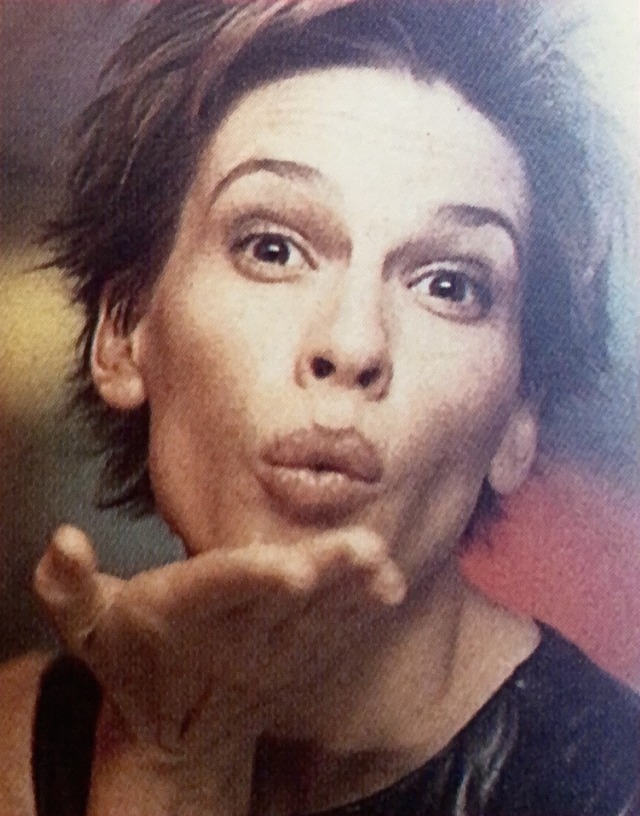
Hilary Swank — Apr. 5th, 2000
< actress, film producer >
insta: mtv.archives
twitter: mtvarchivez
wlw appreciation week, day seven » free choice: favourite wlw headcanon
↳lesbian faith
just keepin’ her warm for ya.
Post link

